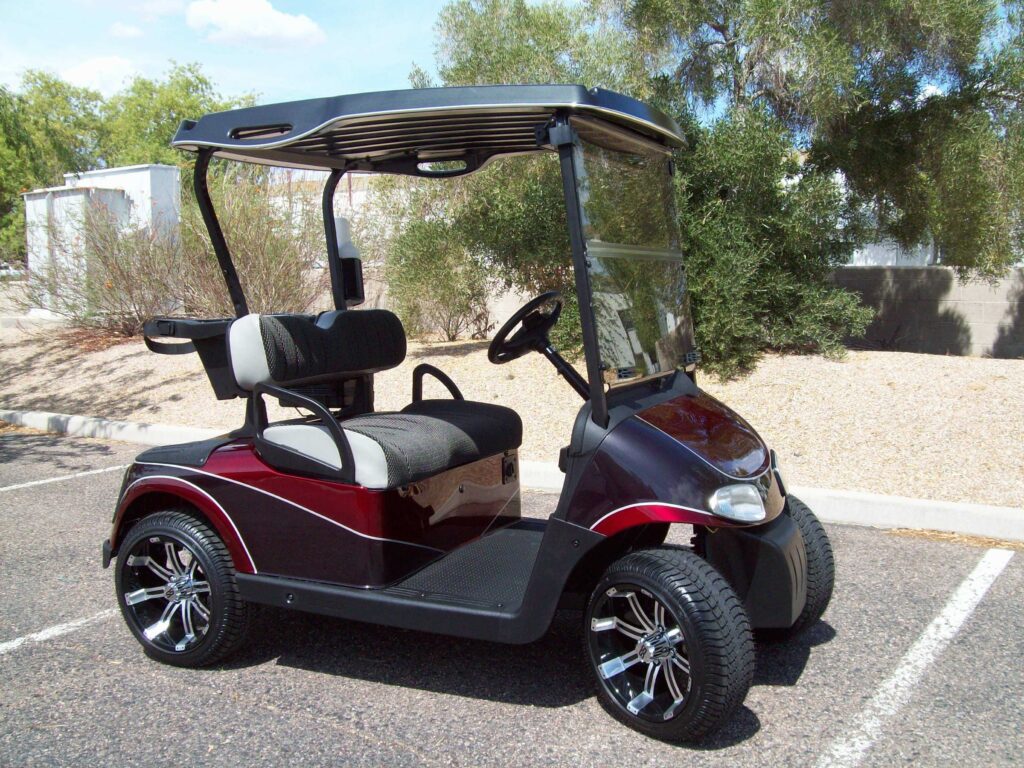Last Updated on October 24, 2023 by Alex PT
Gas golf carts typically have around 10 to 15 horsepower, although this can vary based on the model and make. It’s essential to check the specific specifications of the cart for accurate horsepower information.
Gas-Powered Golf Carts: The Role of Combustion Engines

Gas-powered golf carts are commonly used in golf courses and various recreational settings. The combustion engine plays a vital role in these vehicles:
- Power Source: Gas-powered golf carts are equipped with small internal combustion engines. These engines run on gasoline, which provides the necessary energy to drive the cart.
- Horsepower: These carts typically have 10 to 15 horsepower engines. This power allows them to carry passengers and golf equipment across the golf course efficiently.
- Range: Gas carts often have a longer range compared to their electric counterparts. They can travel longer distances on a single tank of gas, which is advantageous in larger courses.
- Ease of Refueling: Refueling is quick and straightforward. Golf course operators can refuel gas carts at a central location, reducing downtime compared to electric carts that require more time to recharge.
- Maintenance: Gas engines require regular maintenance, including oil changes and tune-ups. However, they tend to be less expensive to maintain over their lifespan.
- Environmental Impact: Gas carts produce emissions, contributing to air pollution and noise pollution. Electric carts are considered more environmentally friendly due to their zero emissions.
- Acceleration: Gas-powered carts often have better acceleration, making them suitable for hilly terrain and challenging courses.
- Cost: Gas golf carts are typically cheaper upfront than electric ones. However, the long-term cost can vary based on fuel prices and maintenance expenses.
- Noise Level: They tend to be noisier due to the combustion engine, which can be a concern for golfers seeking a quieter experience.
- Versatility: Gas-powered golf carts can also be used for purposes other than golf. They are sometimes used for transportation in communities, parks, and resorts.
Factors Influencing Gas-Powered Golf Cart Horsepower
Gas-powered golf carts are commonly used in golf courses and various recreational settings. The combustion engine plays a vital role in these vehicles:
- Power Source: Gas-powered golf carts are equipped with small internal combustion engines. These engines run on gasoline, which provides the necessary energy to drive the cart.
- Horsepower: These carts typically have 10 to 15 horsepower engines. This power allows them to carry passengers and golf equipment across the golf course efficiently.
- Range: Gas carts often have a longer range compared to their electric counterparts. They can travel longer distances on a single tank of gas, which is advantageous in larger courses.
- Ease of Refueling: Refueling is quick and straightforward. Golf course operators can refuel gas carts at a central location, reducing downtime compared to electric carts that require more time to recharge.
- Maintenance: Gas engines require regular maintenance, including oil changes and tune-ups. However, they tend to be less expensive to maintain over their lifespan.
- Environmental Impact: Gas carts produce emissions, contributing to air pollution and noise pollution. Electric carts are considered more environmentally friendly due to their zero emissions.
- Acceleration: Gas-powered carts often have better acceleration, making them suitable for hilly terrain and challenging courses.
- Cost: Gas golf carts are typically cheaper upfront than electric ones. However, the long-term cost can vary based on fuel prices and maintenance expenses.
- Noise Level: They tend to be noisier due to the combustion engine, which can be a concern for golfers seeking a quieter experience.
- Versatility: Gas-powered golf carts can also be used for purposes other than golf. They are sometimes used for transportation in communities, parks, and resorts.
This Table Contains The Major Disparities Between A Gas-Powered Cart And An Electric-Powered Cart.
| Parameters | Gas Powered Golf Carts | Electric Golf Carts |
| Pros | One thing that distinguishes a gasoline-powered cart will run longer on a tank of gas than a single charge of an electric cart. Gas-powered carts generally have more horsepower than their electric counterparts. | You will definitely fall crazy about the electrical golf carts in case you do not like noise. When you are running an electrical cart, they’re just about noiseless. Thus, you will not have disturbing individuals around with noise when running an electrical golf cart. Since they don’t use an engine or fuel oil, their maintenance is negligible. And secondly, you are going to be ready to save a little cash on gas over time. |
| Cons | One thing we hate about gasoline carts is their noise, they are clearly noises than electric carts. Also, you have to consider the cost of fueling them before they can operate. Also, we don’t like that they release emissions into the atmosphere just like other gas-powered vehicles. Furthermore, gas carts generally have a high maintenance cost. | Batteries that are adequately cared for have been found to last upwards of eight years or even more. But all of this boils down to the interest that the electric batteries get during the time of use, the planet where they are saved within the cool winter season days, and much more. Replacement batteries can cost $700 or much more, based on the battery type that the golf automobile of yours requires. |
Gas Powered Golf Carts
Golf carts powered by gasoline use the typical unleaded gasoline. The average of ten to twelve horsepower is exactly what some standard gasoline-powered carts have. Much love that of an automobile, these engines operate best with the same engine maintenance to which of an automobile. The horsepower of almost all golf cart ranges from 10 to 12 HP.
Pros
One thing that distinguishes a gasoline-powered cart will run longer on a tank of gas than a single charge of an electric cart. Gas-powered carts generally have more horsepower than their electric counterparts. And that’s one of the major disparities and advantages that the gas-powered carts have over the electric-powered carts since higher horsepower can translate to top speeds, increased acceleration, and performance on hills.
Cons
One thing we hate about gasoline carts is their noise, they are clearly noises than electric carts. Also, you have to consider the cost of fueling them before they can operate. Also, we don’t like that they release mission into the atmosphere just like other gas-powered vehicles. Furthermore, gas carts generally have a high maintenance cost.
Electric Golf Carts
A rechargeable battery pack powers electric golf carts, meaning that they do not need gasoline or engine oil to operate. Typical electric powered golf carts are able to provide roughly five horsepower, but “torque” is far more apparent with an electrical motor. Various models and batteries are able to provide better performance. Power carts have to be energized every few days subject to frequency of use as well as battery size.
Pros
You’ll certainly fall in love with the electric golf carts if you don’t like noise. When you’re running an electric cart, they are almost noiseless. So, you won’t have to disturb people around with noise when running an electric golf cart. Since they do not use fuel or engine oil, their maintenance is minimal. And secondly, you will be able to save some money on gasoline over time. We also loved that brand new batteries in an electric golf cart are strong enough to take you up to 54 holes of golf on a single charge. Lastly, we loved that there is no emission from electric golf carts since they do not make use of engine oil and gas.
Cons
Batteries that are adequately cared for have been found to last upwards of eight years or even more. But all of this boils down to the interest that the electric batteries get during the time of use, the planet where they are saved within the cool winter season days, and much more. Replacement batteries are able to cost $700 or much more, based on the battery type that the golf automobile of yours requires. Batteries which don’t get the appropriate attention need to be replaced every 2 to 3 years. Accessories like lights, fans, heaters, or stereo will deplete the battery faster and lower battery life.
Final Words – Rounding It Up!
The bottom line is that golf carts powered by gasoline use the typical unleaded gasoline. The average of ten to twelve horsepower is exactly what some standard gasoline-powered carts have. Much love that of an automobile, these engines operate best with the same engine maintenance to which of an automobile. The horsepower of almost all golf cart ranges from 10 to 12 HP. More of a reason they’re better compared to the counterparts, the electrical golf cart. Usually, most electric golf carts have a three to five HP electric motor. We’ve come to the end of this blog post. We hope you were able to find resources in your quest to know the Golf cart horsepower – how many of that in a gas golf cart. Please do not hesitate to contact us for questions or comments. Thanks!

Hi! I’m Alex PT. I hold a Bachelor’s degree in Sports Management from Indiana University and have over seven years of valuable experience working in a Sports Event Management Company. I founded SportBlurb with the passion for bringing you the latest, most insightful, and engaging content in the world of sports. So, whether you’re a die-hard fan or want to stay informed, I’ve got you covered!

